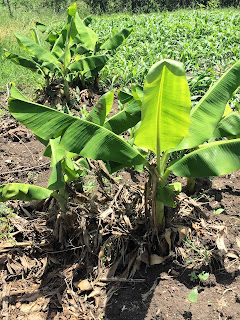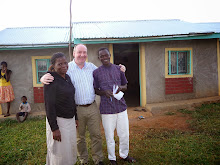It is my last morning in Kisumu for this trip. It has been
brief, but full and I have loved seeing how our children have matured into
lovely young men and women, as well as meeting new children who joined our
family since I was last here.
As the lift was still not working, I carried my bag down the
10 flights of stairs (76 steps) that reach up to the 3rd floor of
the hotel. Each step crunched underfoot.
You see, the rains have brought out the bugs and, each
morning before the cleaners have made it round with their bucketful’s of water
and their wide sweeping brooms, the passageways crunch with the shells of
beetles and flying things, lying, mostly, dead on the floor. I mention this
only in case you are ever tempted to come with the Trust to Kenya one time.
You
would be welcome in the rainy season, but you should know that there are bugs.
Each night I have crawled under a mosquito net and laid down
to sleep, listening to the incessant buzzing of the tiny insects looking for a
tasty vein or two. Apparently it is only the females that bite, the males
preferring nectar to blood. Make of that what you will – though I will confess
that I am on the nectar side of that choice!
 Female mosquitos are particularly adept at feeding, they are
able to sense human breath and to know, from subtle differences in temperature
on the skin, which veins are nearer the surface and where they will best drink
their fill. How I wish my local surgery had similar technology, for when they
need a small sample of my blood!
Female mosquitos are particularly adept at feeding, they are
able to sense human breath and to know, from subtle differences in temperature
on the skin, which veins are nearer the surface and where they will best drink
their fill. How I wish my local surgery had similar technology, for when they
need a small sample of my blood!
It is strangely cosy under a mosquito net which, despite the
nearby buzzing, gives a sense of comfort and protection – a bit like listening
to the rain pouring down outside a window, whilst inside the fire is on and a
cup of hot tea steams.
I had, therefore, slept well last night and woke refreshed
for the day. I had a hot cup of Kenyan tea in the dining room, then packed my
things up for the day.
Moses and I had planned a morning in Kibos, I wanted to walk
around the couple of acres of land we own there, look over the gardens and the
vegetables that will supply our food over the coming months.
 |
| Daniel at KBS |
On our way we called in to KBS, the Kenya Bureau of
Standards, located in a lovely large compound on the Kibos Road from town.
Daniel, who is at Moi University and who I had met on Sunday
at Kachok, is doing a short internship at KBS, furthering his studies before
returning to college next month.
He is really enjoying his time there, though
he tells me that he would love to return to KEMRI (Kenya Medical Research
Institute), which is located by the lake shore on the road to Maseno. He spent
a few months there earlier in the year which he really enjoyed.
“I need to get good grades” he said, “I know I have to work
hard”. He is currently forecast a 2nd Upper Degree in Biochemistry.
I so hope that he makes it.
We left the calm of KBS for the busy dust road to Kibos.
“What is this?” said Moses, looking ahead to where a large
plume of dust rose from the road. It is usually fairly bad around here as
Matatus speed up and down the road, avoiding the bumps and potholes, throwing
up a wave of red mist in their wake, but this morning it was much worse than
usual.
“This wasn’t here when I left” he said.
As we edged closer, all became clear.
“Aaahh”, said Moses, nodding sagely, “It is election season”.
If that was meant to help me to know what was happening,
then I am afraid I failed the comprehension test.
A huge yellow mechanical thing, a cross between a JCB, a
plough, a snow plough and a roller was plying the route, first churning up the
road with the spikes of the plough before returning with the smooth snowplough
/ roller to remake the road in a smoother image.
In early August Kenyan’s will go to the polls to elect their
President. On a more local level, there will also be elections for the County
Governor, for the local senate and the assembly.
It is at election time that many roads get fixed, so the
good job of the Governor will be remembered by the people.
Today it was the turn of Kibos.
 |
| Gerald by the Garden |
We waited, and followed the road the kilometre or so to
Kibos, then on to our place.
A few weeks ago the land was ploughed and Gerald planted it
with Maize and Sorghum in time for the rains to come. The green shoots are now
starting to push their heads into the sunlight and the first weeding has got
underway. Kunde and Sikumawike grow, interspersed with the Sorghum and a
further plot has been planted with cassava.
 |
| A Papaya tree |
Gerald has come to work for us over the last year or so.
Originally from Busia, he now lives at Kibos, taking care of some of the older
boys. I was delighted to meet him this week and know that we will work well
together over the coming years.
Soon it was time to leave, to head off to the airport for my
final hop back to Nairobi and the overnight flight back to Paris and then
Manchester.
We sped back over the new Chinese built flyover to the newly
surfaced Busia / Airport Road.
Kisumu has changed a lot in the years that we
have been coming, it has grown and modernised, new industries have come and
land prices are soaring. The sugar cane factory in Kibos is booming, taking
harvests away from the traditional plants at Mumias. In the next couple of
years a new, Chinese built, standard gauge railway will connect with Nairobi,
where a link will open in a month or two all the way to Mombasa and the ports.
But for all of the infrastructure, for all of the apparent
progress, there are still many children in desparate need.
For every Daniel,
succeeding at university, there are a dozen Wayne’s, not knowing who can help
them, without a hope in their lives.
My experience is that the children don’t need a hand out,
they need a seed planting. Like the maize and the sorghum planted in the
gardens at Kibos, if they can find a little help, protection and water when
things get hot, then they can become the most mighty and wonderful plantings of
hope.
Thank you for reading my blog through this week, I hope I have
managed to share something of the Isaiah Trust family, of my brothers and
sisters, children and grandchildren in hope.
Please feel free to give the trust a “follow” on Facebook
and, for our part, we will try our best to give you regular updates from Kenya.
www.facebook.com/IsaiahTrust
www.facebook.com/IsaiahTrust




No comments:
Post a Comment